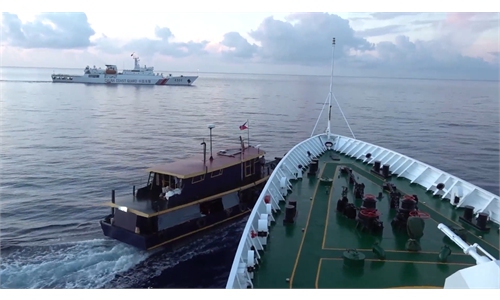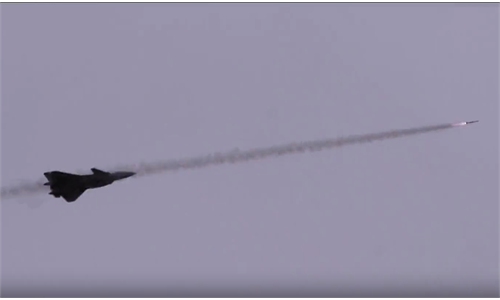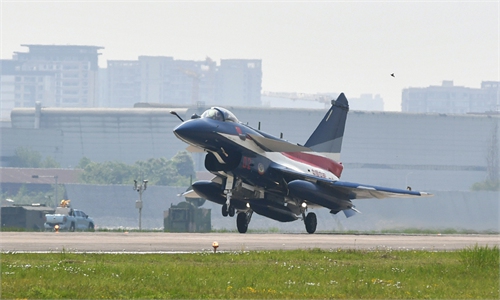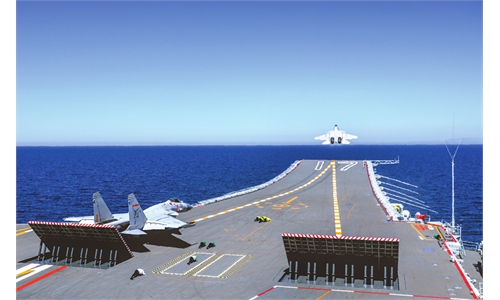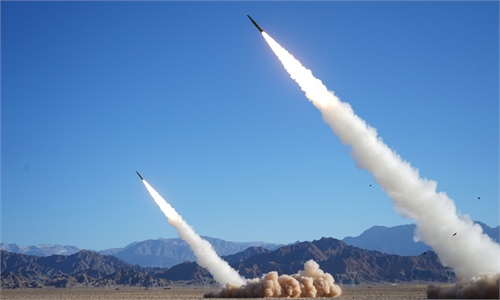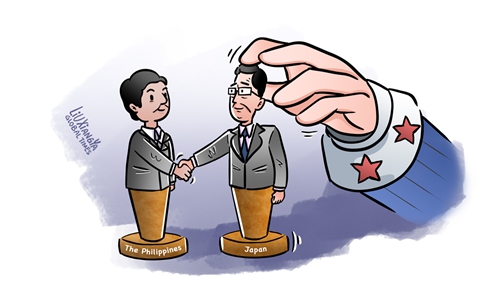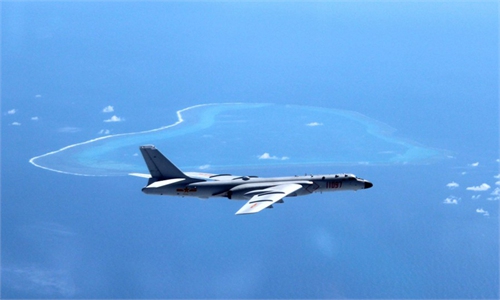The Chinese military will host militaries from Cambodia, Laos, Malaysia, Thailand and Vietnam in Zhanjiang, South China's Guangdong Province from mid-November to late November for the Aman Youyi-2023 (namely Peace and Friendship-2023) multilateral drills, China's Ministry of National Defense said in a press release on Sunday.
Under the theme of joint counter-terrorism and military operations on safeguarding maritime security, the exercise is split into a land part and a sea part, organizing teams to hold joint training, joint command exercises and actual-force drills on counter-terrorism and anti-piracy, the press release reads.
The goal of the exercise is to enhance the participants' operational capabilities in urban counter-terrorism as well as maritime counter-terrorism and anti-piracy, further deepen military mutual trust and pragmatic cooperation, and jointly safeguard regional peace and stability, the Chinese Defense Ministry said.
The Chinese participating forces mainly come from the Chinese People's Liberation Army Southern Theater Command, and foreign participating forces include ground detachments and surface vessels, it said.
Zhang Junshe, a Chinese military expert, told the Global Times on Sunday that the exercise displays the participating countries' mutual trust and common will in safeguarding regional peace and stability.
The South China Sea is one of the world's most pirates-infested regions, making piracy a common threat faced by all countries in the region, and that is why the exercise will focus on counter-terrorism and anti-piracy, Zhang said.
Observers noted that the exercise comes at a time when the Philippines has made repeated provocations since August against China vis-à-vis Chinese islands and reefs in the South China Sea.
Some countries participating in the Aman Youyi-2023 exercise also have maritime disputes in the South China Sea, but they chose the right approach, which is not to let disputes affect friendship and cooperation and jointly safeguard regional peace and stability, Zhang said.
Military expert Song Zhongping told the Global Times on Sunday that under incitement from the US, the Philippines is not playing a positive role in the negotiations for the Code of Conduct (COC) on the South China Sea, bringing uncertainties to the region.
But other ASEAN members understand that there must be no chaos in the South China Sea in order for ASEAN to develop, Song said.
"The US, as a country from outside of the region, does not want the signing of the COC or a peaceful South China Sea. The interference of such external interference must be rejected," Song said.
It is also important for other ASEAN members to persuade the Philippines to safeguard ASEAN's common interests, experts said.
US shadow grows over South China Sea
A Philippine vessel approaches a China Coast Guard vessel in a dangerous manner and leads to a bump in waters off China's Ren'ai Reef in the Nansha Islands in the South China Sea on October 22, 2023. Photo: Screenshot from a video released by China Coast Guard
In a video message to the Opening Ceremony of the Symposium on Global Maritime Cooperation and Ocean Governance 2023 held on Wednesday in South China's Hainan Province, China's top diplomat Wang Yi reiterated China's commitment to settling disputes and disagreements through dialogue and consultation while warning against maritime bloc confrontations.
"Disputes over maritime territory and rights and interests that are left from history should be resolved through friendly consultation between the parties directly concerned. Bloc confrontation and zero-sum games at sea must be firmly rejected," said Wang, Chinese Foreign Minister and a member of the Political Bureau of the Communist Party of China Central Committee.
Wang said China would continue to work with ASEAN countries to fully and effectively implement the Declaration on the Conduct of Parties in the South China Sea (DOC), agree on a Code of Conduct (COC) at an early date, and foster a peaceful and secure order in the South China Sea.
The remarks came amid some disturbing changes in the South China Sea, including the notably frequent provocations from the Philippines against China in the region since August. The increasing provocations have led to growing concerns about potential "violent crashes between China and the Philippines" among experts and officials who closely follow related issues.
In the latest provocative move, the Japanese government promised to give five ships to the Philippine Coast Guard (PCG) to boost its maritime security capability, as the two countries - two of the US' closest allies in Asia - are working with the US to help enhance Manila's security capabilities, according to Reuters.
Apart from the Philippines, Vietnam is also stepping up its land reclamation in the South China Sea. The country has been building a reef in the Nansha Islands and expanded its reclaimed area in the region more than four times in less than a year, according to media reports.
Although frictions, disputes, and claims of conflict have always existed in the South China Sea, some incidents are inevitable. However, it is surprising that these incidents have occurred so frequently in the context of the overall good relations between China and the Philippines, as noted by some experts.
They pointed out that the current tense situation in Ren'ai Reef has largely been caused by the overt or covert intervention of the US, calling on the Philippines to come back to bilateral dialogue to seek peaceful resolution to disputes rather than blindly following a third party's footsteps to target China as an enemy and risk aggravating the situation.
Increasing provocations
The Philippines started the recent wave of provocation over China's islands and reefs in the South China Sea on August 5, when two Philippine transport ships escorted by two Philippine coast guard ships illegally trespassed into waters off China's Ren'ai Reef of the Nansha Islands, forcing the China Coast Guard (CCG) to take lawful, necessary measures, including issuing a warning with water cannons, to block the Philippine vessels that were carrying illegal building materials.
The aim of the trespassing ships was to reinforce a Philippine warship that was illegally grounded on Ren'ai Reef in 1999. At the time, China lodged solemn representations and the Philippines promised several times to tow away the grounded vessel.
Now, 24 years has passed, and the Philippines not only has not towed away the warship, but is attempting to repair and reinforce it now that it is on the verge of disintegration, so the Philippines can occupy China's Ren'ai Reef permanently.
On August 22, the Philippines made another attempt to send illegal building materials to Ren'ai Reef, again sending two transport ships and two coast guard ships, which were again restricted by the CCG.
After the CCG restricted a third attempt by Philippine transport and coast guard ships to reinforce the illegally grounded warship on Ren'ai Reef on September 8, the Philippines switched to Huangyan Island on September 22 to divert China's attention from Ren'ai Reef and increase its bargaining chips.
Following yet another attempt to reinforce its grounded warship on Ren'ai Reef on October 4, which was also restricted by the CCG, the Philippines returned to Huangyan Island on October 10, when a Philippine navy gunboat intruded into waters off the Chinese island despite repeated warnings from the Chinese side.
The Philippine gunboat was expelled by the CCG through professional, lawful measures.
It marked the first event since the start of the Philippines' recent provocations since August that the Philippine side deployed a naval vessel to stir up trouble, which analysts said was a sign of escalation of tensions from a paramilitary level to a military level.
The Philippines then claimed that a Chinese naval vessel had shadowed a Philippine warship on October 15 near Zhongye Island, another Chinese island in the Nansha Islands, to disrupt a resupply mission.
The tensions around Ren'ai Reef again escalated on October 22, when the Philippines hyped collision events in its latest attempt to send vessels to the reef.
In the latest provocation by the Philippines, a Philippine navy corvette illegally trespassed into waters off China's Huangyan Island on October 30.
Instead of the CCG, the Chinese People's Liberation Army (PLA) Southern Theater Command organized naval and aviation forces, tracked and monitored, verbally warned, and then blocked and restricted the Philippine warship in accordance with the law.
With the involvement of military ships from both sides, observers warned of potential violent clashes between China and the Philippines in the South China Sea.
China will not step back when it comes to safeguarding national security and territory, a military expert told the Global Times on condition of anonymity, while for the Philippines, the US will not allow it to retreat.
US shadow
The US is without doubt the biggest negative element that is affecting the peaceful and stable situation of the South China Sea, Wu Shicun, president of the National Institute for South China Sea Studies, told the Global Times.
The overall situation in the South China Sea remains stable and controllable. The second round of text review consultations on the COC have been completed as planned and the third round of review has been officially initiated. At the bilateral level, China and relevant countries such as the Philippines have established emergency communication hotlines between their foreign ministries and have conducted productive dialogue, laying the foundation for the stabilization and improvement of the situation in the region. However, at the same time, there have been some disturbing changes, including increasing military presence by some external countries and bloc confrontation targeting China led by the US, Wu pointed out.
In a recent event, two sorties by a vessel-borne helicopter from the Canadian Navy's frigate HMCS Ottawa with unknown intentions approached China's territorial airspace above the Xisha Islands, and despite the PLA naval and aviation forces' lawful identification, verification and repeated verbal warnings, the Canadian helicopter not only refused to respond, but also took provocative maneuvers including flying at a very low altitude, Senior Colonel Zhang Xiaogang, a spokesperson for China's Ministry of National Defense, said in a press release on Saturday.
It marks a third provocation from the Canadian military over the past month. In mid-October, a Canadian CP-140 reconnaissance aircraft illegally entered China's airspace over Chiwei Islet, approached China's eastern coast and entered the Taiwan Straits for close-in reconnaissance, forcing the PLA Air Force to take lawful management and control measures.
On November 1, the Canadian Navy's HMCS Ottawa frigate made a transit through the Taiwan Straits together with the US Navy's USS Rafael Peralta destroyer, while the PLA handled the event in accordance with the law and regulations.
Since 2021, the US has also been building small cliques with relevant countries in or outside the South China Sea, such as the Quad Security Dialogue between the US, Japan, India, and Australia, and the trilateral cooperation between the US, Japan, and South Korea, as well as the AUKUS alliance between the US, the UK and Australia.
In May this year, the US and the Philippines signed the Bilateral Defense Guidelines. In September, the navies of the two countries launched their first joint patrol in the South China Sea.
The US is attempting to use the joint patrol as a lever to build a mechanism for coordination among the US, the Philippines, Japan and Australia in the South China Sea. These US-led cliques all regard China as an imaginary enemy, according to Wu.
The essence of the disputes over the South China Sea is the disputes over territorial sovereignty and maritime jurisdictional claims among various claimants. While China has been actively seeking and promoting a maritime cooperative mechanism to solve the disputes, the US' partiality and connivance to some claimants has encouraged provocative actions. These claimants do this to enhance their own interests and create a "fait accompli" before the COC is launched, Wu explained.
Such actions hinder the implementation of practical cooperation under the forum of the DOC, Wu noted, and he predicted consultation on the COC would enter a "deep water area" in the third round of the review.
Back to direct talks
The second round of text review for the COC was completed in July during the ASEAN-China Foreign Ministers' Meeting. The ministers agreed during the meeting to complete the COC negotiations before fall 2026, according to the Associated Press.
But the previous two rounds of review did not address core issues such as geographical scope, island construction, oil and gas extraction, and implementation mechanisms. As the negotiations enter the third round, the divergences, the conflicts and the dilemmas of all parties will gradually surface, Wu pointed out. One need not go into the details to imagine how challenging it will be for 11 countries to reach a consensus on these issues, he said.
The Philippines and Vietnam may want the COC to be launched as late as possible so that they can boost their negotiating position with the support of the US. But is the US a reliable backer for these countries? Observers hesitate on this question and have called on relevant countries to put more emphasis on direct talks rather than reliance on the intervention of a third party.
Obviously, the US is the biggest external factor in the South China Sea. It is widely believed in China that the US is behind almost all of the provocations in the South China Sea. But this is only part of the US' strategy to contain China. Another strong concern of the US is to avoid being dragged into conflict merely over land features in the South China Sea, Yang Li, executive director of the Institute for China-Europe Studies, said at a round-table meeting jointly organized by Malaysia-based think tank East West Bridge and Chinese think tank Global Governance Institution (GGI).
Some observers slammed current Philippine President Ferdinand Romualdez Marcos Jr for abandoning his predecessor's more friendly policy toward China. Instead, he has focused more on enhancing ties with the US to promote the development of his country's military capabilities. By doing this, Marcos Jr is hoping to consolidate domestic support. In addition, by constantly provoking troubles with China in the South China Sea, he also wants to test how strong the US-Philippines alliance is, observers said.
In the past six to seven years, the South China Sea dispute between the two countries has been well managed. Relevant bilateral mechanisms have been put in place and have been progressing as planned. However, the current situation between the two countries is continuously escalating. This is because the development of these events is not a simple repetition of what happened 10 years ago, but rather a significant change and deterioration in the environment.
Geopolitical tensions around the world are intensifying, and the strategic competition between China and the US is escalating. In this unfriendly environment, any incident between China and the Philippines will face greater risks. Compared with 10 years ago, today's events are more prone to spiraling out of control. Therefore, both China and the Philippines must demonstrate greater political will, employ more political wisdom, and allocate more resources to address these disputes and differences, experts said at the round-table meeting.
The Chinese People's Liberation Army (PLA) Army is believed to have commissioned a type of tactical ballistic missile, which made its public debut during a recent exercise, according to



